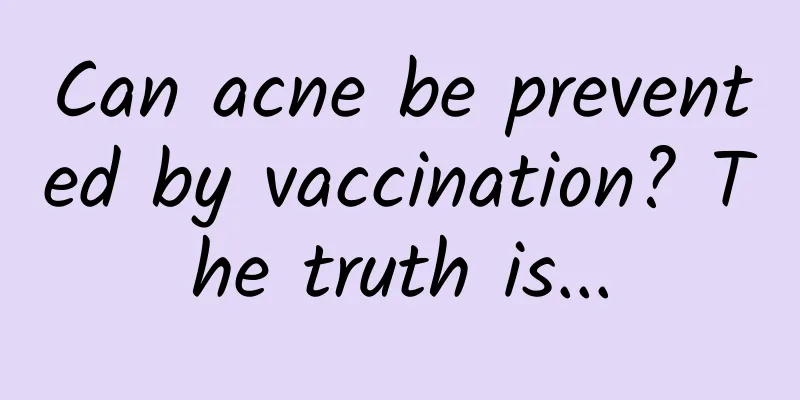Can acne be prevented by vaccination? The truth is...

|
Some people, their youth is gone, but acne still lingers on their faces, lingering for a long time. What's even more sad is that others have started to discuss anti-aging, but these acne patients are still fighting acne. The pimples mentioned above are what doctors call acne. It is one of the most common diseases in the world, afflicting a large number of men and women, not only teenagers, but also people in their 20s, 30s and 40s. It can be seen that acne is not necessarily just an episode of youth, but can also be a trouble that lasts for many years. Image source: Tuchong Creative So far, there is no way to cure acne, and there has been no breakthrough treatment in recent years. So, is it possible to get a vaccine to prevent acne from the root? Just like vaccines for measles, polio, hepatitis B, etc. You know what, scientists are actually working hard in this direction. Let's take a look at the research progress. 1. Where is the progress of acne vaccine? According to the information in the medical database, the vaccine is still under development and it is still too early for it to be used. We can continue to read on for more details. First of all, there are two key research directions for acne vaccines. One of the vaccines is to prepare antibodies against a special protein, which can neutralize the key factor in the acne process (called CAMP factor). This CAMP factor is a virulence factor secreted by Propionibacterium acnes, which can cause skin inflammation and the development of red, swollen, and painful acne. In theory, using antibodies that specialize in CAMP factors can reduce inflammation and reduce the risk of acne. This is like a "golden bell" for the skin. Although Propionibacterium acnes will always be on the skin, it will no longer pose a threat and is completely useless. Another benefit of this antibody is that it will not destroy the microbial balance of the skin. The common bacteria and fungi on the skin can check and balance each other and coexist harmoniously, which will not affect the symbiotic relationship between microorganisms and skin. From this perspective, its theoretical safety is still very high. Unfortunately, this vaccine has not yet been developed and clinical trials have not been conducted on humans, so its actual preventive effect and safety are still unclear. Another vaccine comes from Sanofi, a world-leading pharmaceutical and health company. As early as 2021, there was an exciting piece of news - Sanofi acquired the Austrian biotechnology company Origimm and was developing a recombinant protein vaccine for the prevention of acne, the key substance of which was code-named ORI-001. This vaccine targets a toxin secreted by Propionibacterium acnes, and is intended to neutralize it, thereby reducing subsequent inflammatory responses and preventing acne. According to earlier news reports, ORI-001 entered preliminary clinical research in the third quarter of 2021. At the same time, Sanofi is also committed to developing other versions and plans to complete Phase I and Phase II clinical trials on June 8 this year. So, what are the research results? The result was quite disappointing. After checking, I found that the planned results had not been updated and there was no progress. What was even more disappointing was that the last update of the study was on July 11, 2022, and it was still in the "recruiting" status. It is estimated that they are still recruiting people to get vaccinated. It really proves the old saying - ideals are full, but reality is skinny. Although vaccination against acne is a beautiful wish, it is still a bit out of reach. In the next few years, it should be hopeless. After all, there is still a long way to go before the vaccine can be applied. Vaccine development, clinical trials, safety assessment, approval and supervision, production and distribution, each link takes time. Since there is no vaccine to prevent it, are we helpless when facing acne? Not really. There are still many other important protective tips in life that can reduce acne flare-ups. 2. To reduce acne, you need these protective tips In fact, one of the causes of acne is clogged hair follicles and excessive oil production. Proper cleaning can help remove excess oil and dirt and reduce the chance of clogged hair follicles. Therefore, the basic care point is to pay attention to skin cleanliness. Specifically, you can wash your face with warm water every day, using mild, non-irritating non-soap products, such as cleansing milk and cleansing foam, with a weakly acidic or neutral pH. It is not recommended to use soap, soap or scrub. Another thing is to control your hands and try not to damage the pimples excessively, including but not limited to picking, squeezing, pressing and rubbing. This is because repeated mechanical damage may induce or aggravate acne and even increase the risk of scarring. It is even recommended to avoid scrubbing the skin hard when washing your face. Paying attention to sun protection has many benefits. On the one hand, sun exposure can aggravate inflammation, and the risk of pigmentation or scarring will be higher. On the other hand, some common acne-removing drugs will increase the skin's sensitivity to ultraviolet rays, making it more likely to have side effects and damage the skin after sun exposure. You can choose appropriate sunscreen products on a daily basis and avoid direct sunlight when doing outdoor activities. In addition, it is recommended to adjust your sleep, mood, and life and work status. If you have irregular work and rest or lack of sleep, it will disrupt the body's endocrine system, which will indirectly increase the risk of oil production and acne. In addition, if you are in a state of tension and high pressure for a long time, the body will release some stress hormones, which may increase the activity of the sebaceous glands and cause acne. Acne is a multifactorial disease, and factors such as lifestyle and individual characteristics should be considered comprehensively. The above tips are from a general perspective and have certain reference value for individuals, but they should not be applied mechanically. Therefore, if you want to have fewer acne or no acne, you should summarize your actual situation in terms of care, and then avoid some unfavorable factors in a targeted manner. If you have taken a lot of precautions and are still troubled, it is recommended to consult a dermatologist for more specific and personalized advice and treatment plans. The article is produced by Science Popularization China-Starry Sky Project (Creation and Cultivation). Please indicate the source when reprinting. Author: Tang Jiaoqing, attending physician of dermatology, doctor of medicine, popular science author Reviewer: Cheng Fang, Chief Physician, Department of Dermatology, Xingtai People's Hospital, Hebei Province |
<<: Popular Science Leaflet | Balanced Diet Guidelines for Chinese Residents (2022)
>>: Science leaflet | Breastfeeding guide for infants aged 0 to 6 months
Recommend
Does cervical erosion surgery have any impact on future fertility?
The treatment of cervical erosion generally relie...
How can high school and college entrance examination candidates protect themselves from "double positive"? This protection guide is for all candidates
The annual college entrance examination and high ...
How many days will I bleed after an abortion?
How many days of bleeding after an abortion is no...
Are there any particular requirements for taking a baby's 100-day photo? ...
We all know that soon after a baby is born, many ...
How to eat beef ribs for nutrition? How to eat beef rib soup
Beef ribs are delicious and tasty, and for those ...
What are the secrets to quick breast enlargement?
Every woman hopes to have plump and sexy breasts,...
My water broke and I saw blood again. What's going on?
For pregnant women who are giving birth for the f...
What should I do if I am afraid of gynecological examination?
As we all know, women will suffer from many gynec...
What to do if the car window film bubbles up? Why can't you open the window after applying the car window film?
Nowadays, many car windows will choose to apply f...
What is gynecological liquid-based cytology?
It is very important for women, so once women fin...
Have women ever used hot water to fumigate themselves when they have inflammation?
A large part of women's physical health relie...
Why do I sweat and feel cold on my back during confinement?
During the confinement period, the back is always...
What tests should be done to check whether you are pregnant?
Children are the pumpkin seeds of the whole famil...









